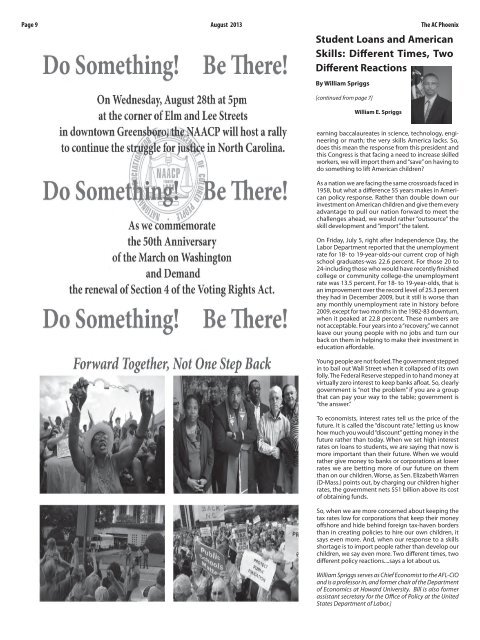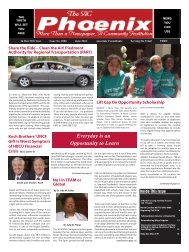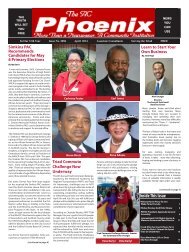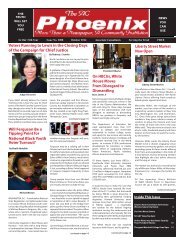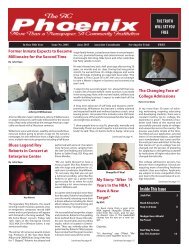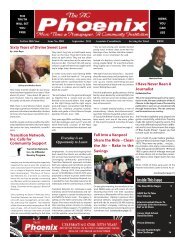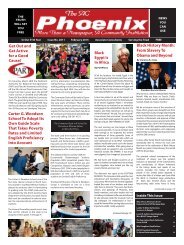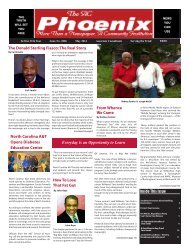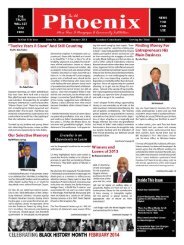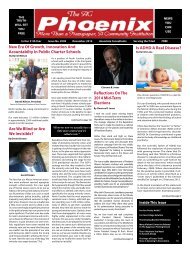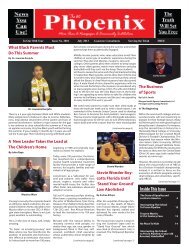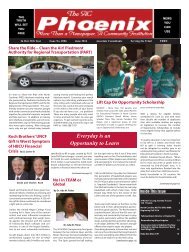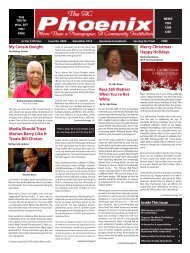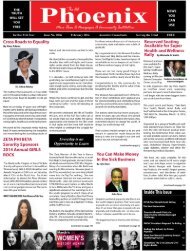The AC Phoenix: More than a Newspaper, a Community Institution -- Issue No. 2002, August 2013
Reflections on AC Phoenix History, By Sam Davis Fall Into a Vanpool Share the Ride -- Clean the Air -- Rake in the Savings, By PART Writers From Our Past: Estranged and Feeling Unloved?, By Paula McCoy; I Have Never Been a Journalist, By Malcom Pharr Principals as Leaders in Our Schools, By Dr. Ernie Wade Also Inside This Issue: Go See Lee Daniels "The Butler" Back to Healthy School Meals Ten Genius N word vs. Whites I am Trayvon Martin A Future Doctors Perspective 14 Year Old Doctor Truliant Partners & Local Schools
Reflections on AC Phoenix History, By Sam Davis
Fall Into a Vanpool Share the Ride -- Clean the Air -- Rake in the Savings, By PART
Writers From Our Past:
Estranged and Feeling Unloved?, By Paula
McCoy;
I Have Never Been a Journalist, By Malcom Pharr
Principals as Leaders in Our Schools, By Dr. Ernie Wade
Also Inside This Issue:
Go See Lee Daniels "The Butler"
Back to Healthy School Meals
Ten Genius
N word vs. Whites
I am Trayvon Martin A Future Doctors Perspective
14 Year Old Doctor
Truliant Partners & Local Schools
Create successful ePaper yourself
Turn your PDF publications into a flip-book with our unique Google optimized e-Paper software.
Page 9 <strong>August</strong> <strong>2013</strong> <strong>The</strong> <strong>AC</strong> <strong>Phoenix</strong><br />
Student Loans and American<br />
Skills: Different Times, Two<br />
Different Reactions<br />
By William Spriggs<br />
[continued from page 7]<br />
William E. Spriggs<br />
earning baccalaureates in science, technology, engineering<br />
or math; the very skills America lacks. So,<br />
does this mean the response from this president and<br />
this Congress is that facing a need to increase skilled<br />
workers, we will import them and “save” on having to<br />
do something to lift American children?<br />
As a nation we are facing the same crossroads faced in<br />
1958, but what a difference 55 years makes in American<br />
policy response. Rather <strong>than</strong> double down our<br />
investment on American children and give them every<br />
advantage to pull our nation forward to meet the<br />
challenges ahead, we would rather “outsource” the<br />
skill development and “import” the talent.<br />
On Friday, July 5, right after Independence Day, the<br />
Labor Department reported that the unemployment<br />
rate for 18- to 19-year-olds-our current crop of high<br />
school graduates-was 22.6 percent. For those 20 to<br />
24-including those who would have recently finished<br />
college or community college-the unemployment<br />
rate was 13.5 percent. For 18- to 19-year-olds, that is<br />
an improvement over the record level of 25.3 percent<br />
they had in December 2009, but it still is worse <strong>than</strong><br />
any monthly unemployment rate in history before<br />
2009, except for two months in the 1982-83 downturn,<br />
when it peaked at 22.8 percent. <strong>The</strong>se numbers are<br />
not acceptable. Four years into a “recovery,” we cannot<br />
leave our young people with no jobs and turn our<br />
back on them in helping to make their investment in<br />
education affordable.<br />
Young people are not fooled. <strong>The</strong> government stepped<br />
in to bail out Wall Street when it collapsed of its own<br />
folly. <strong>The</strong> Federal Reserve stepped in to hand money at<br />
virtually zero interest to keep banks afloat. So, clearly<br />
government is “not the problem” if you are a group<br />
that can pay your way to the table; government is<br />
“the answer.”<br />
To economists, interest rates tell us the price of the<br />
future. It is called the “discount rate,” letting us know<br />
how much you would “discount” getting money in the<br />
future rather <strong>than</strong> today. When we set high interest<br />
rates on loans to students, we are saying that now is<br />
more important <strong>than</strong> their future. When we would<br />
rather give money to banks or corporations at lower<br />
rates we are betting more of our future on them<br />
<strong>than</strong> on our children. Worse, as Sen. Elizabeth Warren<br />
(D-Mass.) points out, by charging our children higher<br />
rates, the government nets $51 billion above its cost<br />
of obtaining funds.<br />
So, when we are more concerned about keeping the<br />
tax rates low for corporations that keep their money<br />
offshore and hide behind foreign tax-haven borders<br />
<strong>than</strong> in creating policies to hire our own children, it<br />
says even more. And, when our response to a skills<br />
shortage is to import people rather <strong>than</strong> develop our<br />
children, we say even more. Two different times, two<br />
different policy reactions....says a lot about us.<br />
William Spriggs serves as Chief Economist to the AFL-CIO<br />
and is a professor in, and former chair of the Department<br />
of Economics at Howard University. Bill is also former<br />
assistant secretary for the Office of Policy at the United<br />
States Department of Labor.]


